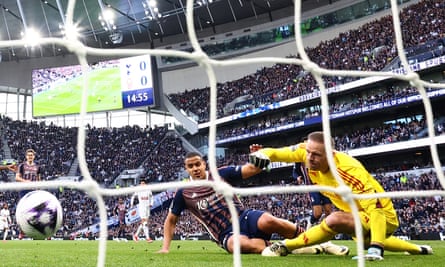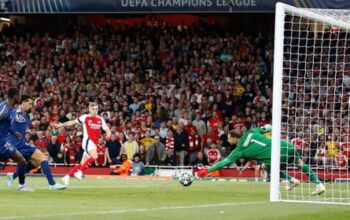It’s about the points deductions. It couldn’t not be about the points deductions. In another world, in another season, Everton v Nottingham Forest would just be 16th v 17th (at the start of the weekend). Except that in another world, the points deductions wouldn’t have happened and so it would be 14th v 17th but with 17th starting the weekend five points clear of the Premier League relegation zone and so a lot less anxious than Forest actually are. This is the points deduction derby.
At Goodison on Sunday, there will be protests and coloured cards, chants about corruption, perhaps even a sense of fraternity, two clubs united in a brotherhood of outrage. There will be a great sense of the injustice of it all, which is not entirely unreasonable: when you look at what’s happened in football over the past couple of decades – the wage inflation, the absurd sums spent – you can understand why fans might think: “Why us? How come we’re the ones who’ve been done for this?”
That is before you get to the number of points deducted that, detailed as the rationalisations have been, still seem unsettlingly, perhaps inevitably, arbitrary. It only adds to the perception of unfairness that Manchester City’s case remains unheard, Chelsea continue to be investigated, and that the regulations will almost certainly be changed soon anyway.
There are still the appeals to come. Forest’s will be heard in this coming week, although it’s not clear when a decision will be reached, and Everton’s at some point after that. The Premier League had initially announced a backstop date of 24 May, five days after the last games of the season, for all issues to be resolved but the independent appeals board confirmed this past week it would make a decision before the final day. That’s something, although the lack of clarity is still far from ideal; it may be that Luton think a draw at West Ham in their penultimate game is a good result, only for them to find out a few days later that really they had needed a win. And that’s before you get to potential legal action. None of that seems fair or good for the general perception of the competition.
None of which is to say that financial fair play (FFP), profitability and sustainability rules (PSR), or whatever the new system based on Uefa’s system of “squad cost ratio”, ends up being called is necessarily wrong. Rather, since the practice of home teams paying away teams 20% of gate receipts was abandoned in 1981, some sort of system has been needed to check the endless cycle of the rich winning and so getting richer and so winning more.
The horse has well and truly bolted but if traditional notions of competition, of clubs representing their communities rather than the elite becoming global brands seduced by and trying to seduce a worldwide fanbase (a driver of ticket-price inflation, which has become an increasing concern for almost every Premier League club), there was need for a more stringent version of FFP far earlier.
When the authorities introduced the maximum wage for players in 1901, the aim was less to protect the profits of club owners (although by the time the maximum wage was abolished in 1961, that had certainly been the effect), who were restricted in the dividends they could draw, than to prevent wealthier clubs offering higher salaries to lure the best players, upsetting the competitive balance that made the league viable.
The two factors that have done most to destabilise existing league structures – the inflationary soaring of player wages and the ever-growing gulf between rich and poor – were foreseen and addressed by the Victorians who established the Football League.
Perhaps FFP, PSR or squad cost ratio is not the best way to address those problems in the modern age and, in fairness, it is not why spending controls were introduced; the idea was to prevent clubs overspending their way to oblivion. But the fact remains that Everton and Forest were present when the issues were discussed and the regulations voted upon.
Whatever flaws the system may have, they signed up to them and, if others were sticking within the limits, it is only right that they should face sanctions for breaching them.

While the points deductions have – obviously – made a difference, it is also true that Everton and Forest have underperformed this season. Based on the most recent accounts, Everton have the ninth most costly squad in the Premier League while Forest’s is 13th.
Even allowing for a certain amount of bedding in for a new manager in Everton’s case and new players (lots of them) plus a new manager in Forest’s, on that basis neither club should be anywhere near a relegation battle.
after newsletter promotion
It is not hard to identify where Everton’s problem lies. Their expected goals scored is 47.2, the 10th highest in the league. Their actual goals scored is 32, the second-lowest figure in the league. That disparity is by some margin the biggest in the league; Brentford, with -6.4, are the next biggest underperformers.
It is perhaps not a surprise that in the list of non-penalty goals minus xG, a rough measure of finishing efficiency, Dominic Calvert-Lewin is ranked lowest out of the 565 players to have attempted a shot in the Premier League this season, with Beto sixth bottom.
Then just as Calvert-Lewin scored two in two games – an unconvincing penalty and a goalkeeping clearance that bounced off him as he charged it down, admittedly – he succumbed to yet another injury.
For Forest, the problem is at the other end: only Sheffield United perform worse against their xG conceded, which says something about Forest’s goalkeeping and their haplessness in defending set plays.
Whether those flaws alone would be enough to take them down is doubtful but, as it has turned out, the points deductions have functioned as a handicap to keep the battle at the bottom interesting – although it would be rather more interesting if anybody had a clue what was going on and how many points might be needed to stay up.
That absurdity, though, does not mean Everton and Forest should not have been docked points, nor that some mechanism for trying to level the playing field is not necessary. Just perhaps not this one, or not in this way.
Source: theguardian.com


